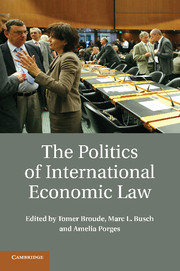Book contents
- Frontmatter
- Contents
- Contributor List
- Acknowledgments
- 1 Introduction
- Part I The Politics of Law Making in International Trade
- Part II The Politics of International Investment Treaty Making
- Part III The Politics of Sovereign Wealth and International Financial Law
- 9 The Politics of Sovereign Wealth Funds
- 10 The Politics of International Financial Law and the Global Financial Crisis
- Part IV The Politics of Dispute Settlement in International Economic Law
- Part V Linkages between International Economic Law and Foreign Policy
- Index
9 - The Politics of Sovereign Wealth Funds
Benign Investors or Smoking Guns?
Published online by Cambridge University Press: 03 May 2011
- Frontmatter
- Contents
- Contributor List
- Acknowledgments
- 1 Introduction
- Part I The Politics of Law Making in International Trade
- Part II The Politics of International Investment Treaty Making
- Part III The Politics of Sovereign Wealth and International Financial Law
- 9 The Politics of Sovereign Wealth Funds
- 10 The Politics of International Financial Law and the Global Financial Crisis
- Part IV The Politics of Dispute Settlement in International Economic Law
- Part V Linkages between International Economic Law and Foreign Policy
- Index
Summary
INTRODUCTION
The U.S subprime financial crisis of mid-2007 and a further deceleration of the U.S. economy, largely driven by the housing market correction, created unprecedented opportunities for several sovereign wealth funds (SWFs) to acquire, at distressed prices, portfolio investments and assets in North America and Western Europe. This chapter focuses upon the politicization of recent investments by SWFs from “non-Western” countries such as the acquisitions of the Chrysler Building and portfolio stake holdings in Barclays, Credit Suisse, Citigroup, Merrill Lynch, Morgan Stanley, and UBS AG. In Section 2, the chapter takes note of the initial hostile reactions of certain Western countries, placing them in historical context. SWF investments have been perceived as potential threats to the national security and economic interests of Western recipient states. Such politically driven perceptions are reminiscent of the arguments raised in earlier times by developing countries in the discourse with capital-exporting, developed countries concerning the New International Economic Order. The political rhetoric of “national security” and “sovereignty” has been raised as a shield or sword, depending on the disparate national interests of states at the relevant times. The use of such archaic and elusive rhetoric obfuscates real issues by accepting and treating national security and interests as a paramount concern. This chapter therefore proposes an alternative, holistic perspective for the analysis of any SWF investment.
- Type
- Chapter
- Information
- The Politics of International Economic Law , pp. 211 - 235Publisher: Cambridge University PressPrint publication year: 2011

